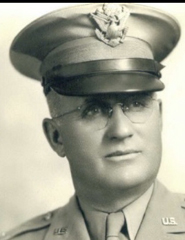Servicemen Look Toward Civilian Life
By Frank Miles
Air Power Press camp in Germany (IDPA) -- For several days before the end of the war in Europe, officers, soldiers and correspondents at the front expected it at almost any moment. There was no let down on the part of the Americans anywhere.
I heard a radio announcement that Hitler was dead. A scribe, who understands Germans, said he thought it authentic because he usually could distinguish between German facts and propaganda.
The next day I flew to Paris, where I tried to be included in the group of reporters I heard would be allowed to witness the surrender document when that event came. Only 16 out of hundreds were allowed the privilege.
From there I flew to London. Then I returned to Paris 2 hours after the news of the surrender had been made public officially. The streets were jammed with singing, screaming, yelling crowds. Most of the people were walking. Hundreds were packed into American and French vehicles. By nightfall it was almost impossible to navigate anywhere. The din was terrific.
A truck load of liberated French prisoners of war were given clearance to mighty cheers as it roamed here and there, which was fine but some Americans, Englishmen and Frenchmen thought of precious boys, whose bodies would never be freed from graves or at sea. Their happiness over the cessation of the carnage was dampened by the knowledge that so many loved ones would never celebrate.
Many correspondents were indignant because though the surrender was signed at Rheims early the morning of May 7, politicians in Washington, London, Moscow and Paris promptly took peace away from the generals and their men who had won it and for nonsensical reasons ruled it could not be announced for 36 hours and fighting must go on for 9 hours after that.
General Eisenhower wanted combat to cease the minute the defeated Germans signed the document. The enemy had quit so why shouldn't the allies since every minute of fighting meant more casualties? How many boys died in those last 45 hours the records will some time show and and the piddlers with blood on their hands will eventually be known I hope.
New York and other American cities went crazy, we heard here.
"Some of my countrymen first tear leaves out of the telephone books and throw them out windows, then they get a little drunker and throw out books, then more liquor and they throw out furniture and after awhile want to throw themselves out and should," said a crippled American doughboy sadly. "I can understand how people may be pleased over victory but it's beyond me they get all hilarious when so many boys won't come back and so many will return home to suffer the rest of their lives."
I was in Paris until May 11 when I flew back to air power press camp, close to where a few nazi die-hards were still sniping across the border in Czechoslovakia.
"When do we go home?" was in the mind of nearly every officer and doughboy. Word that home going and discharges would be based on a point system set thousands of figuring. One Iowa lad said he could count only 84 points and with 85 the minimum he supposed he was bound for the Pacific.
Lt. Gen. Alexander M. Patch, commanding the 7th army, which captured Munich and had swept 1,000 miles, taking 650,000 prisoners enroute, predicted at a press conference the Japanese would be beaten within a year. He was lucky man in a pool on the date of the war's end here.
Many airmen are "up in the air" over what the future holds for them. Rumors for all forces fly thick and fast with few in the European theater actually knowing anything. Moreover, it will take time for the war department in Washington to get leveled off. Some of the soldiers in Germany say that if they must stay overseas they would like duty here or in France or England but at the same time make it clear they won't hesitate at battle against the Japs if needed. Others assert that if they must stay away from home they want to go quickly because they prefer to be in excitement.
All -- eagerly looking forward to coming home some time -- though some won't, are thinking of what they will do when they are civilians again. That's something for civilians to study, too.
Source: Mason City Globe-Gazette, May 24, 1945
![]()

